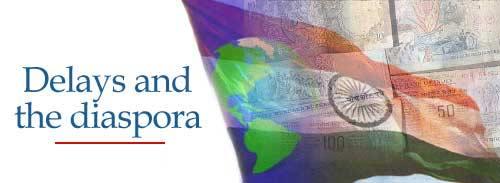 | « Back to article | Print this article |

Complaints about India's treatment of Indians abroad who have risked their savings in their country of birth reminded me of Manmohan Singh, when he was finance minister, quoting John Maynard Keynes to a group of American businessmen in Houston, Texas. "In the final analysis," he said, "investment is also an act of faith." State Bank of India, please note!
We are quick to accuse those who hesitate to send money to India of lacking in patriotism. We also compare Non-Resident Indians unfavourably with the overseas Chinese.
But as Michael Backman and Charlotte Butler -- who claim in their book Big in Asia: 25 Strategies for Business Success that the 21st century will belong to Indians -- remind readers, there is a crucial difference between the two races. While doing business with the Chinese means developing relationships, "in India it's about making money first."
Clearly, NRIs are not big risk takers. Indians migrate for just one reason -- to make the money that was impossible at home. But in the process, they also learn to appreciate the transparency, punctuality and efficiency of the societies that enable them to make money.
That is where the country they have left behind, with its notorious clerical lethargy, seems so inadequate to the dynamics of the modern marketplace.
The diaspora to which New Delhi looked for help during the first Gulf War turned out to be a disappointment. Of the $2 billion that NRIs moved out of India's external rupee accounts during the war and the political upheavals of 1990-92, about $1 billion was withdrawn between April and June of 1991 alone.
But that is no reason why the State Bank of India should drag its feet over redeeming the five-year, tax-free Resurgent India Bonds carrying interest of between 6.25 per cent and 8 per cent (depending on whether they were bought in American dollars, pounds sterling or the deutschemark) that were floated with such flourish and fanfare in 1998.
Payment became due on October 1. People all over the world are waiting with mounting anger for their capital and promised interest. A friend tells me that senior SBI officials to whom he has sent reminders by post and e-mail do not bother to acknowledge them.
Another friend's informal inquiries elicited the information that only 20 per cent of the money had been returned two weeks after maturity.
I remember the elaborate roadshows and dinner parties of the launch. They were held in London, Paris, Zurich, Geneva, Frankfurt, Amsterdam, Brussels, Dubai, New York, Singapore, Hong Kong and other places. Local dignitaries (like Lord Bagri, the Conservative life peer, in London) were roped in for support.
Buyers were assured that RIBs would be repaid "on the due date or the next working day if the due date is a holiday." Kalpana Killawala, one of the Reserve Bank's general managers, reiterated the promise on the Internet.
Of course, no one suspects an august institution like the SBI of running off with the money. But it's the impact and impression that matter. A humble ledger-keeper in Bombay can damage India's reputation. Delay means actual loss for investors. It also violates normal business practice.
Misgivings were expressed on both sides even in 1998. I heard murmurs that the market offered better returns and that depreciation would erode the RIB's accumulated value. Some even wondered about the borrower's ability and readiness to make timely repayment.
On the other side of the fence, people questioned the scheme's feasibility. Would it prove attractive? Could India afford the interest? I recall S Venkitaraman, the former Reserve Bank governor, being a sturdy supporter. He thought RIBs might yield between $6 billion and $8 billion.
The actual collection of $4.23 billion ($2 billion from the Emirates alone) fell short of his optimistic prediction but was considerably above the original expectation of $1.5 billion. Apparently, the RBI has already cleared the $5.185 billion that SBI will now have to pay out. So, what is SBI up to?
Let me return to Big in Asia. The authors say that "Globalisation, the proliferation of English as the world language of business, the rise of the service sector and the importance of technology -- all things that favour Indians and overseas Indians -- mean that the importance of the overseas Indians is changing relative to that of the overseas Chinese.
In short, the overseas Chinese are losing ground. As a commercial diaspora, overseas Indians -- as many as 25 million Indians live outside India -- have never been as important as they are now, and their influence is increasing."
India can get this affluent and influential community on its side easily enough. But not just by rhetoric. It must demonstrate market ethics and a sense of responsibility. It is instructive in this context to remember that the reason for launching the RIBs was to give a fillip to flagging investment.
The appalling state of our roads, railways and communications was (and is) a major deterrent to foreign investment.
The infrastructure has to be improved to match the rate of investment in China. But that is not the only criterion. The manner in which investors are handled should also inspire confidence.
SBI officers should be more responsive. Repayment cannot be a grudging favour when collection was so exuberant. Promises ought to be kept without reminders.
If delay is unavoidable, interest must be paid for the period that people are denied access to their own funds. This is an internationally recognised legal responsibility. The moral obligation is even greater.
India's credibility is at stake.